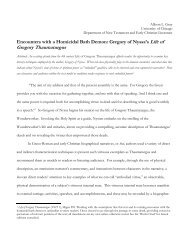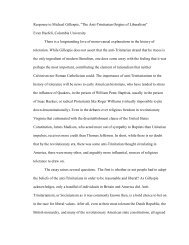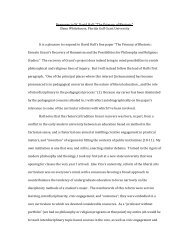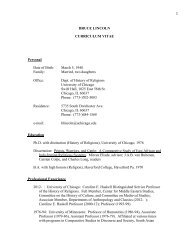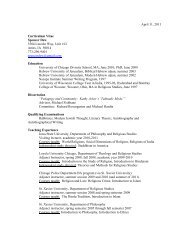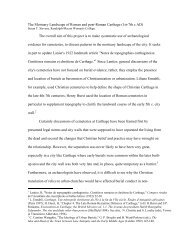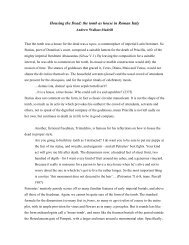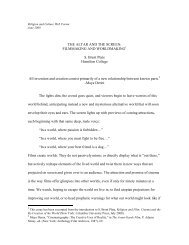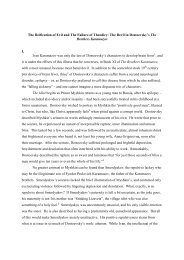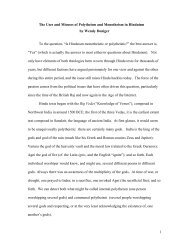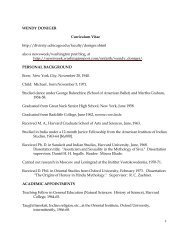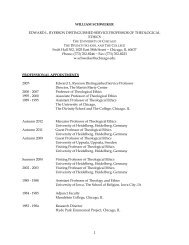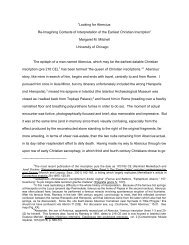*Criterion Winter 02-4.16 - Divinity School - University of Chicago
*Criterion Winter 02-4.16 - Divinity School - University of Chicago
*Criterion Winter 02-4.16 - Divinity School - University of Chicago
You also want an ePaper? Increase the reach of your titles
YUMPU automatically turns print PDFs into web optimized ePapers that Google loves.
Barbour is the messenger, bringing us the good news that the world is whole again,<br />
that science and religion are not at war . . .<br />
synthesis <strong>of</strong> religion and science. Barbour’s sympathies are<br />
explicitly with dialogue and integration. He opposes those<br />
who see science and religion in inevitable conflict and<br />
considers independence as an opportunity lost: “compartmentalization<br />
avoids conflict, but at the price <strong>of</strong> preventing<br />
any constructive interaction.” 2 Barbour then goes on to<br />
show how religion and science can dialogue with one<br />
another and come together in the domains <strong>of</strong> astronomy<br />
and creation, quantum physics, evolution, and the biological<br />
and neurological view <strong>of</strong> the human being. Barbour is the<br />
messenger, bringing us the good news that the world is<br />
whole again, that science and religion are not at war, that<br />
we are all—scientists and theologians and laymen—part <strong>of</strong><br />
one, big, happy world.<br />
Let me express my skepticism here. I find the current<br />
discussion unsatisfying. In his most recent book, When Science<br />
Meets Religion, in fewer than two hundred pages, Ian Barbour<br />
shows us how to reconcile science and religion in all <strong>of</strong> the<br />
major areas <strong>of</strong> modern science where we might think that<br />
they conflict. He shows us how to put science and religion<br />
in dialogue with one another. The Barbourians see themselves<br />
as laying to rest the old view that the two are in<br />
conflict. But this seems too easy to me: there is something<br />
superficial about the consistency that Barbour imposes.<br />
I feel as if someone has played the shell game with me: Put<br />
the pea under one <strong>of</strong> the cups, shuffle them around, and<br />
pick one up. The pea is not there any more, but it cannot<br />
have disappeared.<br />
I do not mean to defend the views <strong>of</strong> Draper and White.<br />
I think that their reading <strong>of</strong> history is problematic; they<br />
present many cases <strong>of</strong> the eternal warfare between science<br />
and religion that simply do not fit. But that does not mean<br />
that Draper and White were entirely wrong. They were<br />
expressing, I think, what they and their contemporaries<br />
felt—that modern, secular science is in conflict with traditional<br />
religion. Their books are a witness to this tension, which<br />
continues today in many quarters, although obviously not<br />
in Barbour’s comfortable world. Now that Barbour and his<br />
theological allies have publicly embraced science, they<br />
might hope that the conflict that so troubled Draper and<br />
4 W INTER 20<strong>02</strong><br />
White has been resolved and the tensions dissipated. I<br />
think this is wishful thinking. My suspicion is that the conflict<br />
has been displaced to another level. Pick up the right cup<br />
and we will find the pea.<br />
My task in the rest <strong>of</strong> this talk will be to find the source<br />
<strong>of</strong> the tension between secular atheism, associated with<br />
modern science, and the theological perspective. What is it<br />
that the believer and the modern scientific nonbeliever<br />
disagree about? Why is it that I, a modern, Enlightenment<br />
nonbeliever, find myself completely unmoved by the kind<br />
<strong>of</strong> compatibilist arguments that the Barbourians present?<br />
By pursuing these questions, I think we will find not just<br />
an account <strong>of</strong> science as it relates to religion, but a whole<br />
epistemology <strong>of</strong> religious belief.<br />
PASCAL: THE HEART KNOWS<br />
In thinking about this problem I find myself led back to<br />
one <strong>of</strong> my favorite authors, Blaise Pascal. Some <strong>of</strong> his<br />
remarks may serve as an interesting starting place for<br />
reflection on the topic at hand, although I do not follow<br />
him all the way. (I warn you that there is not enough space<br />
in this essay to give a careful account <strong>of</strong> Pascal’s subtle and<br />
deep thought. What I will <strong>of</strong>fer instead is a quick and<br />
somewhat simplified account <strong>of</strong> some aspects <strong>of</strong> his thought<br />
that will serve as a springboard for some other ideas I would<br />
like to present.)<br />
Pascal’s project in what has come down to us as the Pensées<br />
was to convince the libertine to abandon his ways and<br />
become a believing, practicing Christian. Unfortunately,<br />
Pascal died before the project was completed. We were left<br />
with a series <strong>of</strong> notes that he had made for that final work,<br />
some as short as a few words, some as long as a few pages.<br />
From these words, published under the inappropriate title<br />
Pensées (Thoughts), we must attempt to reconstruct Pascal’s<br />
original project.<br />
If one were to undertake the project <strong>of</strong> convincing someone<br />
to become a Christian, presumably the first thing that<br />
one would do would be to give that person reasons, arguments,<br />
or some rational motivation to adopt the position under




